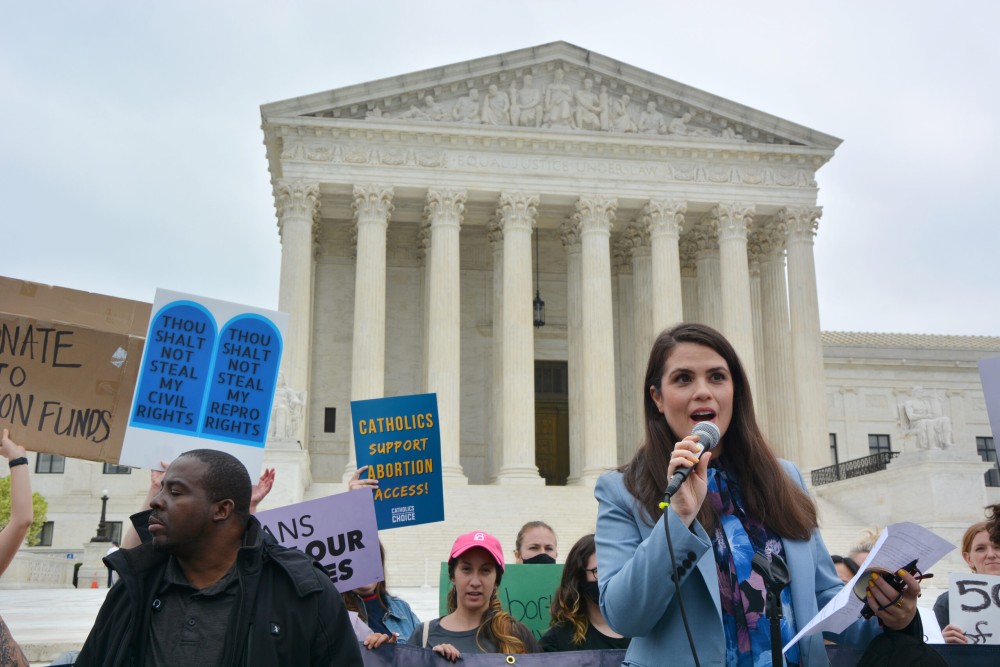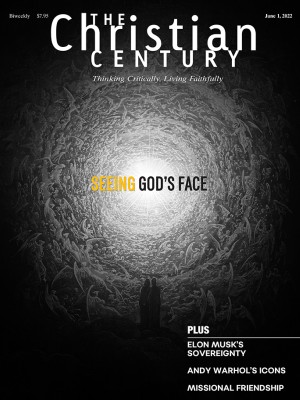Faith groups gather at Supreme Court after leak

Jamie Manson, head of Catholics for Choice, was watching Netflix when Politico published US Supreme Court justice Samuel Alito’s draft majority opinion arguing for overturning Roe v. Wade. Like many Americans, even devoted activists on the issue, Manson wasn’t expecting the news. She said it took multiple calls from her staff to get her attention.
The decision, however, did not surprise her.
“The ruling? Not shocking,” she said in an interview. “We listened on December 1 to the arguments. We know the makeup of this court. We have five radically anti-choice Catholics on this court, so we weren’t surprised. I hope it wakes people up. Because I think most folks have been in denial that this is happening.”
Read our latest issue or browse back issues.
The next day, Manson was one of hundreds of demonstrators on both sides of the abortion debate who gathered outside the Supreme Court to lift their voices and raise up prayers, responding to the prospect that a right to abortion at the national level will lose its legal grounding after a half century if Alito’s draft becomes official.
“I am one of 68 percent of Catholics in the United States who do not want to see Roe v. Wade struck down,” Manson said to a crowd of abortion rights supporters, referring to a 2019 Pew Research poll that showed broad support for upholding Roe among religious groups.
“I call on all people who support abortion rights because of their faith—not in spite of it—to be as loud as you can be,” she said, pausing after being interrupted by cheers. “If Roe falls, the right wing is going to claim it as a victory for religion, and a victory for faith and Christianity. And that is a lie.”
Sheila Katz, head of the National Council of Jewish Women, also spoke at the rally.
“I’m here to say loudly that Jews support abortion,” she said. “The Torah is clear on this issue: abortion is not only permitted in Judaism but in some cases required when the life of the pregnant person is at stake.”
A few feet away, abortion opponent Steve Corson stood alone holding a Bible and a shofar while wearing a red Trump hat. An Arizona native, Corson said he traveled to Washington weeks earlier as part of the People’s Convoy, a caravan of truckers and others who oppose government COVID-19 vaccine mandates.
His faith, he said, also compelled him to oppose abortion.
“I heard about the possible ruling to end Roe v. Wade, and I think it would be one of the greatest miracles ever done in the United States of America—under God,” said Corson. “I know God Almighty does not care for abortion at all. He hates it. He despises it.”
Asked about the faith leaders who back abortion rights, Corson replied, “I feel sorry for them.
“Any pastor or Christian-type person, any godly person in America and in the world that does not stand against abortion is a sick soul to me—and they’re in big trouble,” he said.
After he finished speaking, Corson blew his shofar.
Nearby, a group of people in blue shirts bowed their heads in prayer, expressing thanks for the promise of Alito’s opinion. Members of the group explained they were parents of sixth graders at Christian Heritage Academy, a school in Oklahoma. They were in town by happenstance, as part of a field trip.
“Obviously, being a born-again Christian, trying to live my life that way, to me, it’s pretty black-and-white,” said Adam Bryan, when asked about abortion. He described himself as a firm believer that life begins at conception and that abortion constitutes an act of murder.
According to recent polling from the Public Religion Research Institute, White evangelical Protestants are the major faith group most likely to express opposition to abortion in general, with only 30 percent saying they believe it should be legal in all or most cases. They are also the faith group most likely to support overturning Roe v. Wade, although views are far more split: 46 percent oppose overturning the decision, while 52 percent are in favor.
Other religious traditions not only have voiced support for abortion rights but have taken it up as a cause. While active for decades, religious proabortion advocates have become increasingly visible over the past year: faith leaders and religious groups have been prominently featured at rallies and have filed suit against laws restricting abortion access.
Milling about the crowd on May 3 was Sofia Betancourt, a Unitarian Universalist minister. Noting that her tradition has long advocated for expanding abortion access, Betancourt framed the case as an issue of justice and faith.
“It’s not that the values are new, it’s that the need to reargue the same arguments we’ve already made for justice is becoming more and more clear,” she said. “I hope people will hear this as a call to show up to live their values, to protect the vulnerable among us. Sometimes it is literally about putting our bodies where they need to be most visible, so that the people most impacted in the world—all of us blessed—are not left in this fight alone.” —Religion News Service





